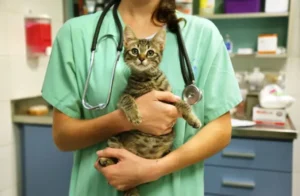Researchers discovered that cats with injuries from wildfires had more overactive platelets than healthy cats or even those with heart disease.

Cats caught in urban California wildfires who suffered burns and smoke inhalation are at risk of forming deadly blood clots, according to a new study.
The study, conducted by researchers at the University of California, Davis’s Veterinary Medical Teaching Hospital, and recently published in the peer-reviewed journal Frontiers in Veterinary Science, follows up on a previous study that found cats injured in urban wildfires had a high chance of developing heart problems.
“Prior to these two papers, we didn’t realize that cats impacted by urban wildfires were prone to forming clots, which can lead to sudden death,” said lead co-author Ronald Li, associate professor of small animal emergency and critical care at UC Davis. “This study will change the standard of care for rescued cats from these wildfires and hopefully save more lives.”
Cats injured in the 2018 Camp Fire in Paradise, California, were some of the subjects for this study. Researchers examined their platelets – cells that circulate in the blood and help stop bleeding or form blood clots.
Researchers discovered that cats with injuries from wildfires had more overactive platelets than healthy cats or even those with heart disease – or, in this case, subclinical hypertrophic cardiomyopathy (HCM), which is the most common cardiac disease in cats and causes a thickening of the heart muscle.
“Cats with HCM are hypercoagulable, meaning they are more likely to form clots,” explained lead co-author Ava Tan, a veterinary research fellow currently working in Li’s laboratory. “That’s why we used them as a control group to compare with cats in the wildfire group.”
Wildfire injuries and clot formation
The platelets of wildfire-injured cats also released high amounts of microvesicles, microscopic membranous bubble-like structures filled with proteins, which are associated with cardiovascular disease and an elevated risk of clotting.
“We found cats exposed to wildfire smoke and injuries are even more prone to throwing clots, showing a direct association between wildfire injuries, platelet response and clot formation,” Tan said.
“We found cats exposed to wildfire smoke and injuries are even more prone to throwing clots, showing a direct association between wildfire injuries, platelet response and clot formation.”
Ava Tan
This study has also led to a third study that is currently being conducted to discover new cellular processes that may explain why feline platelets are so sensitive and prone to clotting, especially in cats with heart conditions or wildfire injuries. “The data collected is critical to developing early treatment plans,” Li said.
